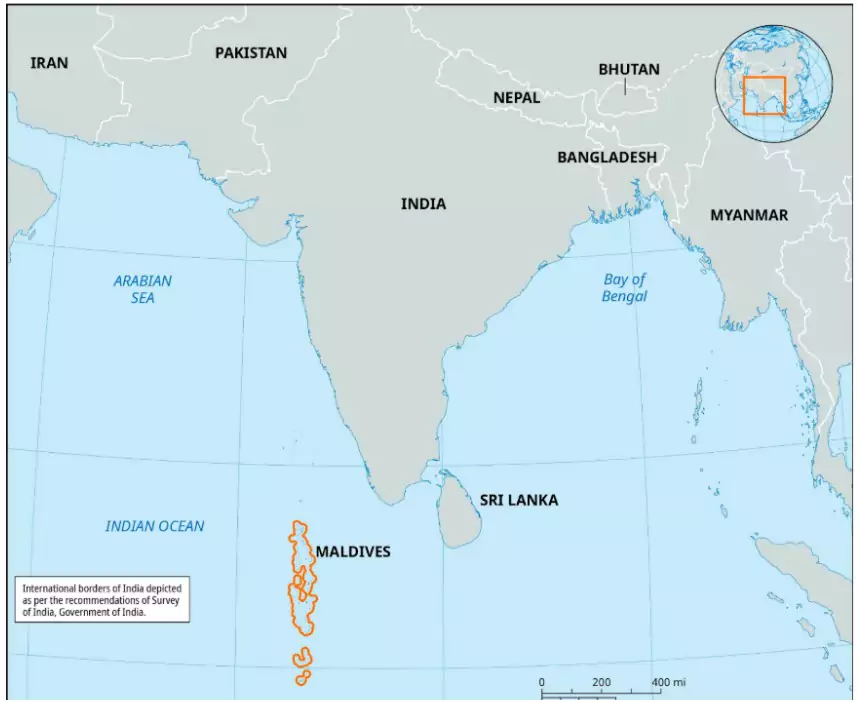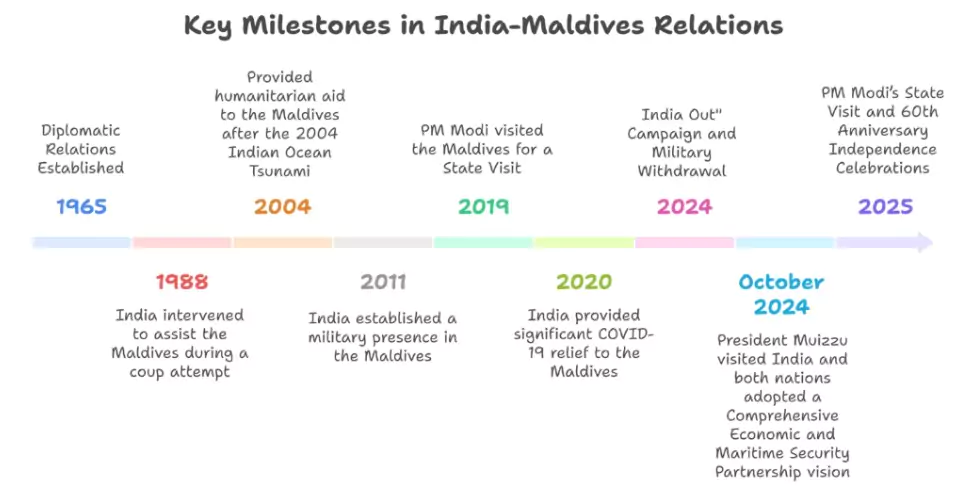Recently, the prime minister visited the Maldives at the invitation of Maldivian President Mohamed Muizzu.

- The Prime Minister will be the ‘Guest of Honour’ at the celebrations of the 60th anniversary of the Independence of Maldives on July 26, 2025.
- This will be the Prime Minister’s third visit to Maldives, and the first visit by a Head of State or Government to Maldives during the Presidency of H.E. Dr. Mohamed Muizzu.
Key Highlights of PM Modi’s Maldives Visit
- Economic Cooperation
- Line of Credit (LoC): India announced a ₹4,850 crore ($565 million) LoC to Maldives to support development projects.
- Debt Relief: India reduced Maldives’ annual debt repayment obligations on GoI-funded LoCs.
- India-Maldives Free Trade Agreement (IMFTA): Both countries initiated negotiations for a bilateral Free Trade Agreement (FTA).
- Bilateral Investment Treaty: Discussions to finalise a treaty to boost investments.
- Digital Transformation: MoUs signed for digital cooperation and other sectors.
- Defence & Security Cooperation
- India assured continued support to strengthen Maldives’ defence capabilities.
- 72 vehicles provided to the Maldivian Defence Ministry.
- Mutual trust highlighted in defence and security collaboration.
- Diplomatic & Cultural Ties
- PM Modi described ties as “older than history, deep as the ocean”.
- Maldives is India’s “neighbour and co-traveller”.
| Indian Pharmacopoeia (IP) is the official book of standards for the drugs being manufactured and/or marketed in India. |
- Health & Technology
- 2 BHISHM Health Cube sets (portable hospitals) handed over.
- Recognition of Indian Pharmacopoeia (IP) by Maldives (boosts Indian drug exports).
- MoU on digital transformation (India’s successful digital solutions to be shared).
- Climate, Fisheries & Science
- Fisheries & Aquaculture: MoU to enhance cooperation in sustainable fishing.
- Meteorology: Collaboration between India’s IITM and Maldives Meteorological Services for weather monitoring.
- Environment: Joint tree-planting under ‘Ek Ped Maa Ke Naam’ and Maldives’ 5 Million Tree Pledge.
India – Maldives Relations
Historical Background
- Diplomatic Relations: Established in 1965; India among first to recognize Maldives’ independence.
- Cultural Ties: Shared ethnic, linguistic, religious, and commercial links rooted in antiquity (Buddhism, maritime trade).
Key Areas of Cooperation
- Defence and Security:
- Historical Trust: India’s aid during 1988 coup attempt built long-term trust; prompt troop withdrawal addressed sovereignty concerns.
- 1988 Operation Cactus: India thwarted a coup attempt, deploying troops swiftly and withdrawing post-crisis to respect sovereignty.
- Capacity Building: India trains ~70% of Maldivian National Defence Force (MNDF) personnel (1,500+ over past decade) at NDA, IMA, OTA, etc.
- Joint Exercises: Bilateral (“Ekuverin”, “Ekatha”) and trilateral (“Dosti” with Sri Lanka; Bangladesh as observer in 2024).
- Infrastructure: India-funded MNDF Composite Training Centre (2019), Coastal Radar System, new Ministry of Defence HQ (2025), and “Ekatha” harbour.
- Maritime Support: Indian Navy provides air assets for surveillance, MEDEVAC (medical evacuation) and SAR (search and rescue) (630+ operations since 2019); medical teams at Senahiya Hospital, Malé.
- Institutional Mechanisms: Annual Defence Cooperation Dialogue (since 2016; 5th in 2024), Joint Staff Talks (7th in 2024).
- Development Assistance:
- Major Projects:
- Greater Malé Connectivity Project (GMCP): USD 565 million project to improve transport infrastructure, launched in 2022.
- Housing: 3,300 social housing units in Hulhumale (2025); 700 handed over in October 2024.
- Infrastructure: Addu Reclamation ($80M LoC, 2024), Addu Detour Link Bridge, Hanimaadhoo Airport redevelopment.
- Health: Indira Gandhi Memorial Hospital (1995, renovated 2017), water/sewerage networks in 28 islands (2024).
- Education: Maldives Polytechnic (1996), Faculty of Hospitality & Tourism Studies (2014), National College for Police and Law Enforcement (2022).
India’s Policies and Initiatives for Maldives
- Neighborhood First Policy: India prioritizes the Maldives under its Neighborhood First Policy, focusing on regional stability, security, and development, making it a central part of India’s diplomatic strategy in the Indian Ocean Region.
- SAGAR (Security and Growth for All in the Region): The SAGAR initiative aims to ensure maritime security and regional cooperation in the Indian Ocean, with the Maldives being a key partner in safeguarding sea lanes and countering external threats.
- MAHASAGAR (Maritime and Holistic Advancement for Security and Growth Across Regions): The MAHASAGAR vision focuses on maritime cooperation and economic partnerships, enhancing security and development in both countries through integrated maritime security and economic growth.
|
-
- Community Development: High Impact Community Development Projects (HICDP) in mental health, education, street lighting (6 inaugurated in 2024, Phase-III MoU in 2025).
- Financial Aid: $1.4B package (2018) including $800M LoC, $400M currency swap; $565M LoC (2025).
- Banking Support: State Bank of India (SBI), operational since 1974, is Maldives’ largest bank, providing loans for resorts, marine exports, and businesses, reinforcing India’s economic influence.
- Economic and Trade Relations:
- Trade Agreement (1981): Facilitates export of essentials; quotas increased for 2025-26, highest since inception.
- Bilateral Trade: Grew from $156.3M (2013) to $548M (2023); key Indian exports: pharmaceuticals, cement, rice; imports: scrap metals.
- Initiatives: Duty-free tuna exports (2022), cargo vessel service (2020), visa-free entry for business (2022), IMFTA negotiations (2025).
- RuPay Card Launch (2024): Facilitates transactions for Indian tourists, boosting Maldives’ tourism recovery post-2024 boycott.
- Local Currency Trade: Agreement to settle trade in local currencies (2024) reduces dependency on foreign currencies, deepening economic linkages.
- Disaster Management:
- First Responder Role:
- 2004 Operation Castor: Provided immediate aid (food, medical supplies) post-tsunami.
- 2014 Operation Neer: Airlifted drinking water during Male water crisis.
- 2020 COVID-19 Relief: Supplied vaccines and medical equipment under Vaccine Maitri.
- HADR (Humanitarian Assistance and Disaster Relief) Exercises: Maldives participates in India-led SAR and pollution control exercises; maiden bilateral HADR exercise planned for 2025.
- Climate Change: Collaboration on renewable energy, coastal protection, and global advocacy (e.g., International Solar Alliance).
- Tourism: India is a leading source of tourism for the Maldives, ranking as 2nd largest source in 2019 and 1st in 2020 during the pandemic.
- More than 1 million Indian tourists visited the Maldives since 2019.
- In March 2022, both countries agreed on an open skies arrangement, enhancing air connectivity.
- Education and Capacity Building:
- India offers substantial support in education and capacity building, including:
- ICCR (Indian Council for Cultural Relations) scholarships for Maldivian students.
- ITEC (Indian Technical and Economic Cooperation) slots for training.
- Key institutional linkages:
- MoUs between Civil Services Commission (CSC) and National Centre for Good Governance (NCGG).
- Cooperation in Judicial Services and Public Service Media.
- Diaspora:
- Approximately 60,000 Indian nationals live in the Maldives, primarily in health, education, construction, and tourism sectors.
- India and the Maldives signed a visa facilitation agreement in 2018 and the Transfer of Sentenced Persons (ToSP) agreement in 2011.

Significance of the Maldives for India
- Strategic Location: Maldives’ proximity to India, position on key Indian Ocean sea lanes (8°N & 1½°N channels) that facilitate maritime trade between the Gulf of Aden, Gulf of Hormuz, and the Strait of Malacca, through which 50% of global trade and 80% of energy supplies pass.
- Countering China’s Expansion: China’s investments, like the China-Maldives Friendship Bridge under the Belt and Road Initiative, aim to expand its influence.
- India counters this through its “Neighbourhood First” and “SAGAR” policies, ensuring the Maldives remains aligned with Indian interests.
- Regional Power Balance: A stable Maldives prevents rival powers from gaining a foothold in the Indian Ocean, safeguarding India’s role as a regional security provider.
- Economic and Trade Relations: India is a major exporter of rice, wheat, medicines, and construction materials to the Maldives, with bilateral trade reaching ~USD 500 million in 2022.
- Defence and Security Cooperation: The Maldives is integrated into India’s coastal radar network, aiding in countering piracy, trafficking, and illegal fishing in the region.
- Diplomatic Engagement: India and the Maldives collaborate in SAARC, BIMSTEC, and the Colombo Security Conclave to address terrorism, climate change, and maritime security.
India’s Significance for the Maldives
- Economic Support
- Essential Imports: India supplies critical goods like rice, vegetables, medicines, and cement, ensuring the Maldives’ food security and construction needs.
- Tourism Revenue: Indian tourists (~200,000 annually pre-COVID) are a major contributor to the Maldives’ tourism industry, which accounts for 25% of GDP.
- The 2024 Indian boycott highlighted this economic dependence.
- Financial Aid: India provides grants and loans for infrastructure, such as water supply systems, housing, and the USD 500 million Greater Malé Connectivity Project, boosting Maldivian development.
- Security Assistance
- Defence Training and Equipment: India trains Maldivian forces and donates assets like patrol vessels, enhancing the Maldives’ defence capabilities.
- Emergency Response: India’s swift aid during crises, such as supplying water in the 2014 Male crisis (Operation Neer) and relief during the 2004 tsunami, cements its role as a dependable ally.
- Maritime Protection: India’s coastal radar network integration helps the Maldives monitor its waters, curbing illegal activities like piracy and trafficking.
- Diplomatic Backing
- Bilateral Engagement: High-level exchanges, like President Muizzu’s visits to India in 2024 and 2025, reflect India’s priority under its “Neighbourhood First” policy.
- Debt Restructuring: India offers lenient repayment terms for loans, easing the Maldives’ debt stress, unlike stricter Chinese terms, as per the Maldives Economic Review (Dec 2024).
- Social and Cultural Contributions
- Educational Opportunities: India provides scholarships through the ICCR, enabling Maldivian students to study in Indian universities.
- Healthcare Access: Indian-built facilities like the Indira Gandhi Memorial Hospital and medical visa programs support Maldivian healthcare needs.
- Community Presence: ~25,000 Indian professionals in the Maldives work in schools, hospitals, and resorts, strengthening social ties.
- Environmental Collaboration
-
- Climate Mitigation: India aids the Maldives’ climate efforts through solar projects and the International Solar Alliance, addressing the threat of rising sea levels.
- Sustainable Development: Indian technical assistance supports eco-friendly infrastructure, vital for the Maldives’ vulnerable ecosystem.
Challenges in India-Maldives relations
- Geopolitical Balancing: China’s growing influence in the Maldives, particularly through investments under the Belt and Road Initiative (BRI), challenges India’s regional dominance
- “India Out” Campaign: The “India Out” campaign led by President Muizzu in 2023, demanding the removal of Indian military personnel, has strained relations, although a compromise was made by replacing them with technical staff.
- Political Shifts: Domestic political changes in the Maldives, particularly the pro-China stance under Muizzu, complicate India’s foreign policy towards the country.
- Economic Challenges and Debt: The Maldives’ reliance on China and India for financial aid and debt servicing creates tensions, with concerns about the growing Chinese debt burden.
- Nationalism and Sovereignty: Anti-India nationalism in the Maldives, especially under Muizzu’s leadership, fueled by the India Out sentiment, complicates the bilateral relationship.
- Regional Rivalries: Pressures from Pakistan, Sri Lanka, and Islamic countries make it difficult for the Maldives to maintain a consistent stance, balancing relations between India and China.
- Tourism and External Campaigns: Tourism, a major economic sector for the Maldives, is impacted by anti-India campaigns, such as the “Boycott Maldives” movement during periods of tension.
- Criminality and Extremism: High unemployment, poverty, and politicized media increase Maldives’ vulnerability to extremism (e.g., ISIS, Al-Qaeda), complicating India’s security cooperation.
- Lakshadweep Competition: India’s promotion of Lakshadweep tourism (400 km from Kerala) was perceived as a rival to Maldives, escalating tensions.
Maldives Overview
- Location: Located south of India in the Indian Ocean (70 nautical miles from Minicoy, 300 from west coast).
- It is the smallest country in Asia.
- Capital: Malé
- Separation from India: The Eight Degree Channel separates India’s Minicoy Island, part of the Lakshadweep Islands, from the Maldives.
- Part of: The Maldives is a member of the United Nations, the Commonwealth of Nations, the Organisation of Islamic Cooperation.
- It is a Dialogue Partner of the Shanghai Cooperation Organisation.
|
Way forward for India-Maldives relations:
- Strengthening Maritime Security Cooperation: India should continue enhancing its maritime surveillance capabilities in collaboration with the Maldives to safeguard vital sea lanes and ensure uninterrupted global trade and energy flows.
- Strengthening cooperation in anti-piracy, counter-terrorism, and maritime domain awareness will help maintain security in the Indian Ocean.
- Expanding Economic and Trade Ties: Both countries should accelerate the Free Trade Agreement (FTA) negotiations to further enhance bilateral trade relations and remove trade barriers.
- Expanding commercial cooperation in tourism, fisheries, and infrastructure development will help diversify the economic partnership and strengthen Maldives’ economy.
- Geostrategic Balancing in the Indian Ocean: India must continue to address China’s increasing presence in the Maldives by offering alternative development assistance and strengthening security cooperation.
- India can use its position to ensure the Maldives remains aligned with India’s maritime security interests, ensuring the Indian Ocean stays free from external influence.
- Climate Change and Environmental Collaboration: Given the Maldives’ vulnerability to climate change and rising sea levels, India should continue supporting environmental cooperation, particularly in renewable energy projects and disaster resilience efforts.
- Solar energy projects and joint initiatives under the International Solar Alliance (ISA) could enhance India-Maldives environmental cooperation.
- Promoting People-to-People Connectivity: Strengthening educational exchanges, scholarships, and cultural ties will help deepen people-to-people relations.
- Expanding capacity-building programs in education, healthcare, and digital infrastructure will foster stronger bilateral connections.
- Fostering Sustainable Development Projects: India should continue assisting the Maldives in sustainable development projects like fisheries management, coastal protection, and eco-friendly infrastructure.
- Collaborative efforts in sustainable tourism and agriculture will ensure long-term environmental and economic stability for both nations.
- Regional Leadership and Multilateral Engagement: India should continue its active role in regional organizations like SAARC, BIMSTEC, and Indian Ocean Rim Association (IORA), alongside the Maldives, to address common regional issues such as security, climate change, and economic development.
- A united approach will strengthen both countries’ influence in regional geopolitics.
- Support for Maldives’ Sovereignty: India must reaffirm its commitment to respecting the Maldives’ sovereignty while balancing security concerns and economic assistance.
- By ensuring the Maldives feels empowered to make independent decisions, India can continue to be a trusted partner without imposing influence.
Conclusion
India-Maldives relations, rooted in historical and cultural ties, are vital for mutual economic, security, and environmental interests. Despite challenges like geopolitical rivalry and political volatility, recent high-level engagements and India’s consistent support underscore a resilient partnership, critical for stability in the Indian Ocean Region.
Additional Readings: Divergence in the India-Maldives Relations
![]() 26 Jul 2025
26 Jul 2025


